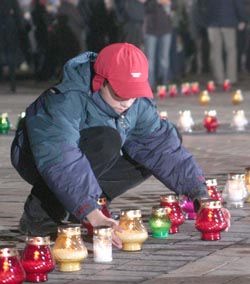Belated triumph of Holodomor victims
Ukraine confronting its terrible past with Europe’s help
The European Union is founded on reconciliation, the belief that we can create a better future by acknowledging our past in all its brutality. Germany has justly acknowledged and is trying to atone for the indescribable atrocities of the Nazi era and the Holocaust. Greece, Spain, and Portugal peacefully turned their back on their right-wing dictatorial regimes and met their future as democratic countries within the EU. The newer EU member states are seeking their own paths to truth and reconciliation through a sincere and uncompromising analysis of their totalitarian pasts.
However, some countries are still trying to hide from their own histories. Despite its status as an EU candidate state, Turkey still denies the Armenian genocide that was committed under cover of the First World War. Russia has also failed to come to terms with the brutality of Stalin’s communist dictatorial regime.
Since gaining its independence in 1991, Ukraine has constantly striven to inform the world community about the famine of 1932-1933, which was intentionally planned by Stalin and is known to us by the Ukrainian word Holodomor. The European Parliament has now recognized the Holodomor as an immense tragedy in the history of humankind. As an old friend of Ukraine and the co-author of the European Parliament’s resolution, I sincerely rejoice over this important and deeply symbolic event.
The goal of our resolution is to express our indignation concerning the Holodomor. The resolution reflects our determination to honor the memory of the millions of victims of the Holodomor, some of whom are still alive and can share their stories. Their testimonies are extremely important because these people will soon pass into history. It is only by reminding ourselves about such heinous crimes against humanity that we can ensure they will never happen again.
This resolution does not contain the word ‘genocide’ because other political groups — mostly communists — think that the strict definition of this term should not be applied to the Holodomor. They claim that genocide as a term was defined in international legislation only after the Second World War. However, I suspect that their real reason is a desire to pacify modern-day Russia, which fears that compensation claims may be lodged against it.
After all, the argument over genocide is not worth risking the resolution in general. It is much more important to have serious support from all political groups. But no one should attempt to belittle the unimaginable sufferings that were inflicted upon Ukraine. No word or words can properly describe the atrocity of the Holodomor. What is important is not so much the text we use but the sentiments we express — solidarity with Ukraine on the 75th anniversary of the cruelties that were perpetrated against its people.
The lesson that we should learn from history is the importance of having solid international legislation and judicial structures if we want the perpetrators of such crimes to be punished. This process was launched in Nuremberg. The tribunal on the former Yugoslavia, which will soon consider Radovan Karadzic’s case, shows that these principles are more important than ever.
This week the European Parliament declared its resolute support for trying Joseph Kony, the leader of the Lord’s Resistance Army of Uganda, in the International Criminal Court. Tyrants who resort to mass killings and destruction should have no place to hide.
The Orange Revolution led by President Viktor Yushchenko embodied Ukraine’s struggle for liberation from Russia’s influence, and it propelled Ukraine on its independent way of development based on shared European values. This resolution is the belated triumph of the Holodomor victims whose voices were lost on the paths of history.
This is also a victory for President Yushchenko. In my opinion, many of the political misunderstandings in Ukraine can be explained by the scale of suffering that this nation has gone through. This bloody event had an impact on Ukraine’s confidence in itself and on stability in this country, which has been making its way in the post-Soviet world. President Yushchenko is absolutely right in saying that Ukraine must acknowledge its past in order to build a better, stabler, and more prosperous future. By acknowledging the Holodomor, the European Parliament supports the position advocated by President Yushchenko.
Ukraine has borne much grief throughout its history. I hope that the next stage in that history involves a sovereign and independent Ukraine rightly taking its place in the not-too-distant future as a full member of the EU. After the Georgia crisis there can be no doubts that many Russian nationalists would like to redraw the borderlines that were established after the breakup of the Soviet Union. However, EU membership will help Ukraine protect itself against any interference with its domestic affairs on the part of its big neighbor. Russia simply needs to get accustomed to a sovereign and independent Ukraine that can independently decide on its future in the European family of nations.
Dr. Charles Tannock (b. 1957) is a British psychiatrist. He has been a member of the European Parliament since 1999 and is the vice-president of the EU-Ukraine PCC delegation and a member of the European Parliament’s Foreign Affairs Committee. Tannock is the co-author of the resolution commemorating the Holodomor, the 1932-1933 man-made famine in Ukraine, and a member of the European People’s Party (Christian Democrats) and European Democrats. He is the author of numerous publications on psychiatry. Tannock was a Councilor in his local Earls Court ward in 1999-2000.
Выпуск газеты №:
№33, (2008)Section
Day After Day





